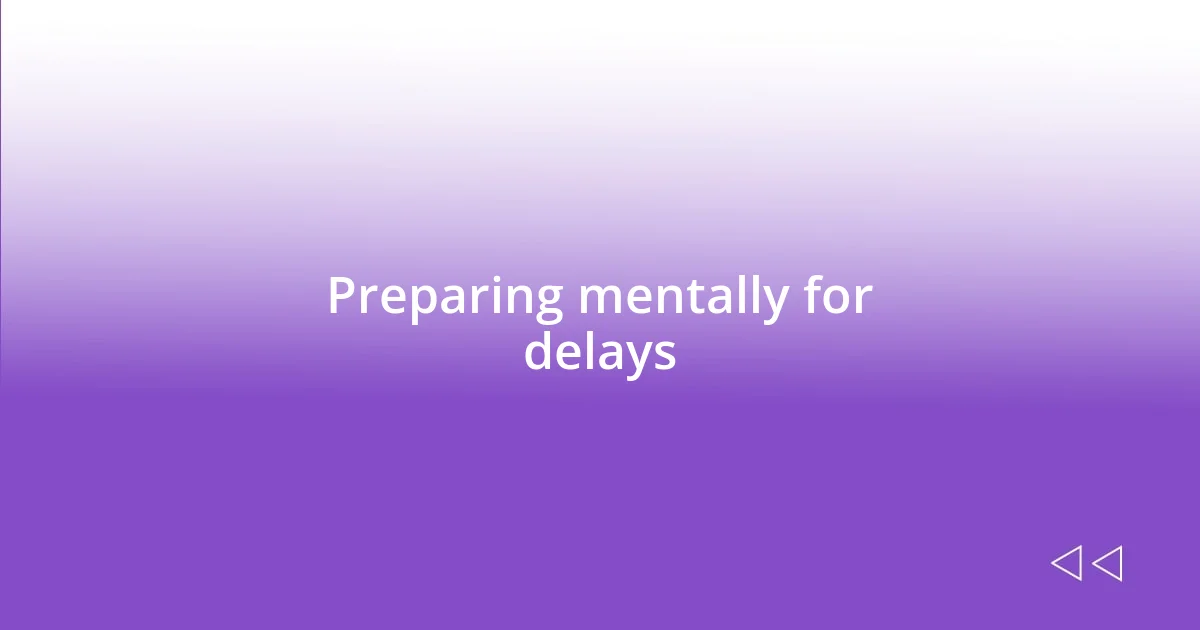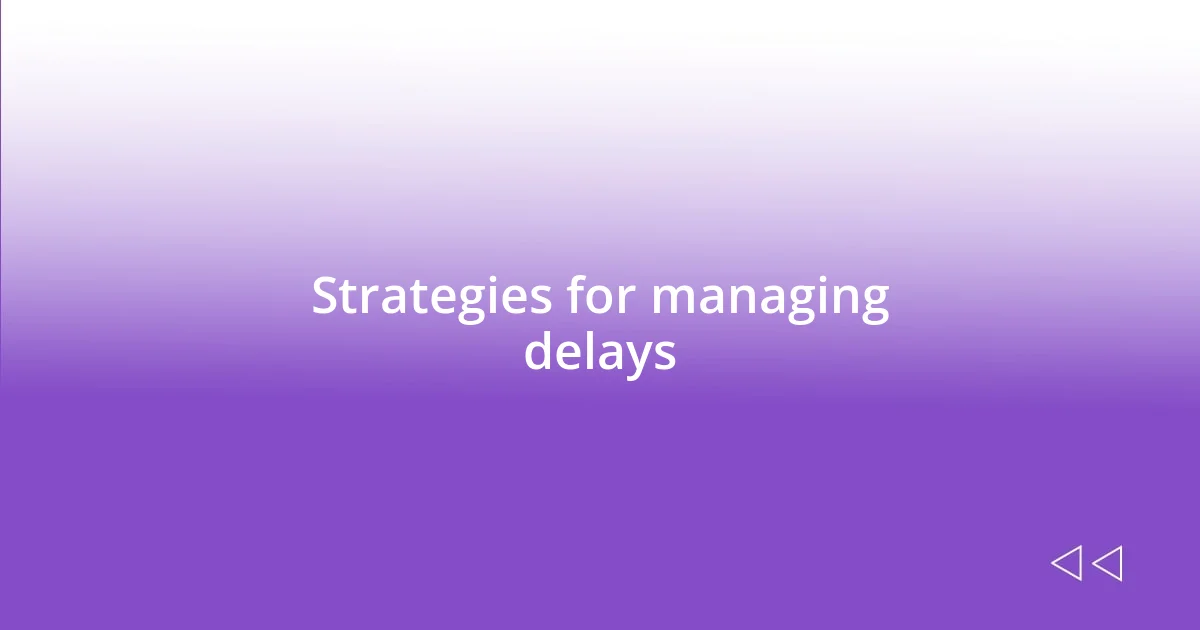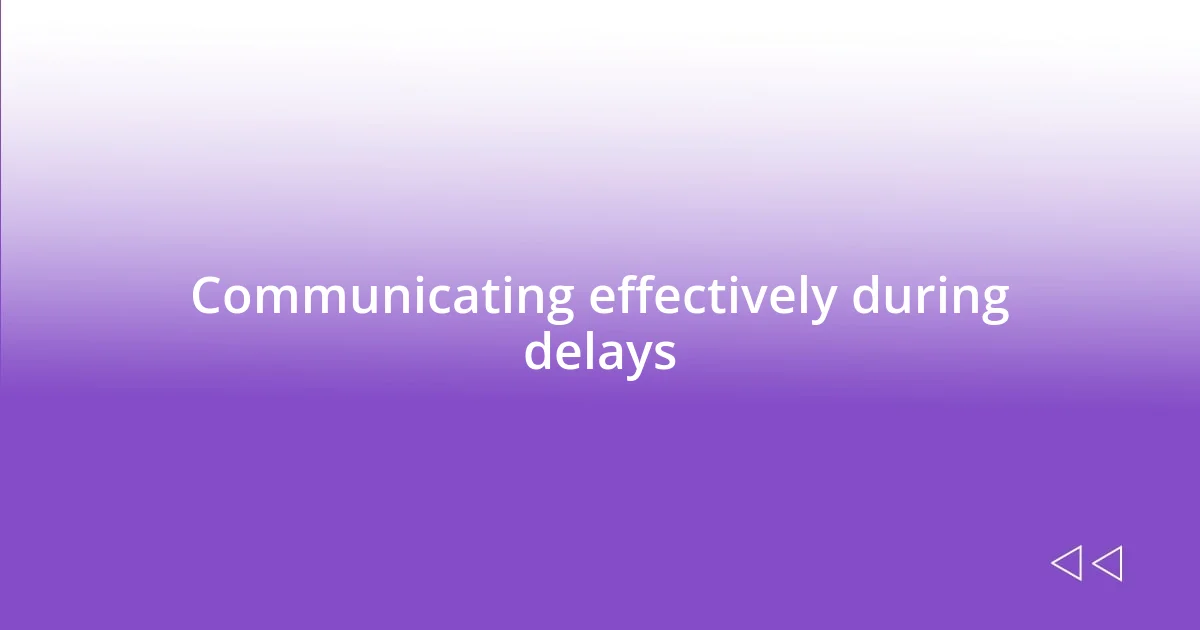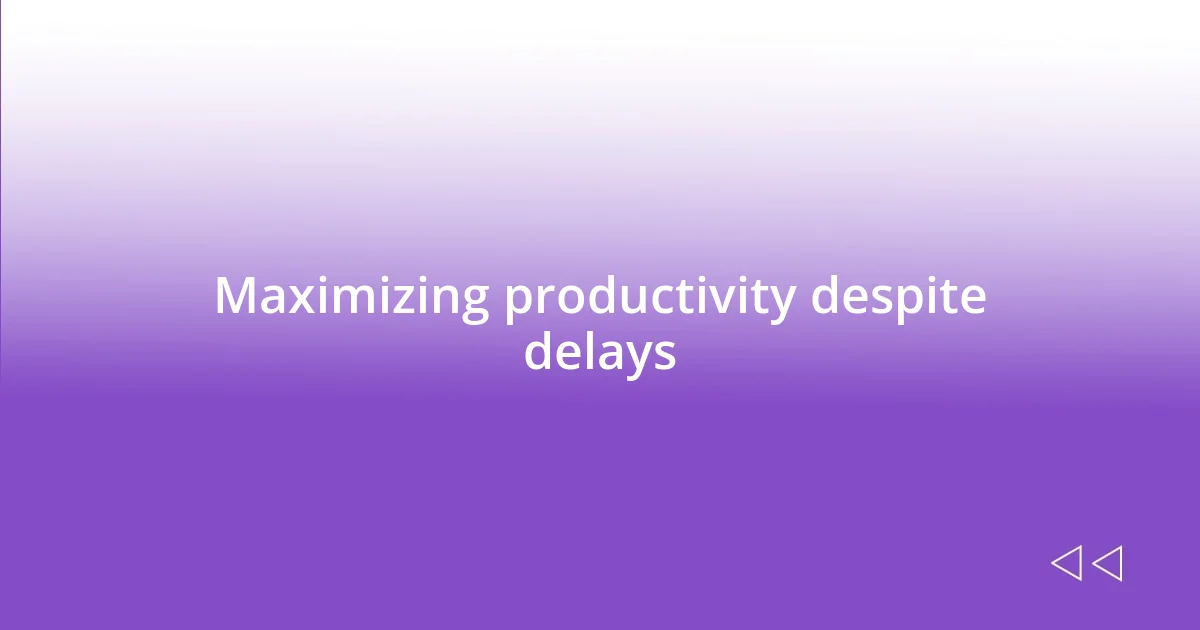Key takeaways:
- Delays often result from poor planning, unexpected circumstances, and miscommunication, highlighting the importance of having backup plans and clear communication.
- Mental preparation for delays involves techniques like deep breathing, reframing situations as opportunities, and embracing flexibility to turn setbacks into productive moments.
- Effective communication during delays fosters camaraderie and trust with teams and clients, emphasizing transparency, empathy, and a constructive tone to navigate challenges together.

Understanding common causes of delays
Delays can stem from various sources, but one common cause I’ve noticed is poor planning. I’ve found myself caught in a web of last-minute changes, which often leads to significant setbacks. Have you ever looked at your calendar and realized you completely underestimated the time a project would take? It’s frustrating, isn’t it?
Another frequent culprit is unexpected circumstances, like sudden weather changes or technical glitches. I recall a time when a thunderstorm unexpectedly hit, leaving me stranded and scrambling to adjust my schedule. It made me realize just how crucial it is to have a backup plan in place—one that anticipates the unanticipated.
Lastly, let’s not overlook the human factor, such as miscommunication among team members. I vividly remember a project where assumptions were made instead of clarifying responsibilities, resulting in chaotic delays. Isn’t it remarkable how a simple conversation could prevent these setbacks? This experience taught me that clear communication is essential to keep everything on track.

Preparing mentally for delays
Preparing mentally for delays is crucial for maintaining focus and resilience. I’ve often found myself experiencing a rush of anxiety when delays occur. To combat this, I take a moment to breathe and remind myself that delays are sometimes beyond my control. Have you ever tried just stepping back for a second? It helps to regain perspective.
Another tactic that has worked wonders for me is mentally reframing the situation. Instead of viewing a delay as an obstacle, I see it as an opportunity to reassess my priorities. For instance, during a long wait for a meeting to start, I once used that time to review notes and prepare questions, turning a frustrating wait into productive moments. Isn’t it amazing how shifting your mindset can transform a scenario?
Lastly, I often reflect on the importance of flexibility. Life is unpredictable, and realizing that plans can change at any moment has made me more adaptable. I recall a time when a project deadline was pushed back unexpectedly; instead of panicking, I used that extra time to fine-tune my work. It led to a better final product. Doesn’t it feel liberating to embrace unpredictability rather than resist it?
| Approach | Description |
|---|---|
| Breathing Exercises | Taking a moment to breathe and reassess emotional responses during delays. |
| Reframing Delays | Seeing delays as opportunities for reflection and better preparation instead of setbacks. |
| Flexibility | Embracing change and adapting plans to make the best of unexpected situations. |

Assessing the impact of delays
Assessing the impact of delays involves looking at both short-term and long-term effects on my projects. When I encounter a delay, I usually feel a wave of frustration wash over me, especially if it’s something I had meticulously planned for. Just last month, a critical hardware issue pushed back the launch of a project I’d invested weeks in. I learned that assessing potential impacts quickly helps me prioritize what really needs my attention moving forward.
Here are a few key aspects I consider when evaluating the impact of delays:
- Resource Allocation: Are my team members engaged in other projects? Balancing resources effectively can be tricky when timelines shift.
- Client Expectations: How will this delay affect what my clients expect? Open communication is essential to maintain trust and understanding.
- Rework Needed: Will the delay necessitate revisiting any previous work? Sometimes, the best approach is to adapt what’s been done to better fit the new timeline.
I also delve into the emotional ripple effects delays can create. The initial shock may spark irritation, but I often realize that these moments can provoke valuable conversations. For instance, when a marketing campaign launch was delayed due to creative differences, the subsequent discussions not only clarified our objectives but also strengthened our team dynamics. This taught me that assessing the emotional ramifications of delays is as important as considering the logistical challenges.
Here are some emotional impacts I reflect on during delays:
- Stress Levels: How is the team responding? Recognizing elevated stress can open avenues for support.
- Morale Booster: Can discussing the delay foster unity among team members? I find that sharing experiences can create a stronger bond.
- Personal Growth: How can I turn this delay into a learning situation for myself or my team? Personal reflections during these times often lead to innovative solutions.

Strategies for managing delays
Embracing a proactive mindset is one of my go-to strategies for managing delays. For example, when my flight was unexpectedly delayed last summer, I turned it into an opportunity to catch up on reading. Instead of sulking in discomfort, I grabbed a book I had been meaning to dive into. Have you ever found joy in a delay like that? It shifted my focus from frustration to something enjoyable and enriching.
Another effective approach I’ve practiced is creating a backup plan. I’ve learned that having alternatives can greatly reduce stress when delays occur. A few months ago, a last-minute cancellation for a meeting left me with unexpected free time. Instead of wasting it, I reached out to some colleagues for an impromptu brainstorming session. It sparked creativity and led to insights we hadn’t considered before! Doesn’t it feel empowering to have a plan B instead of just waiting around?
Lastly, I focus on self-compassion during these moments. It’s easy to start feeling overwhelmed or defeated when things don’t go as planned. One time, after a big event didn’t turn out as I envisioned, I found comfort in reflecting on what I’d learned instead of fixating on the disappointment. Sharing those feelings with friends who understood helped me feel less isolated. I realized that everyone encounters delays, and it’s a natural part of the journey. Have you ever taken a moment to simply be kind to yourself during tough times? It can genuinely transform your perspective.

Communicating effectively during delays
When facing delays, I’ve discovered that communicating effectively is a game changer. Recently, during a project delay due to unexpected technical challenges, I made sure to update my team immediately. I didn’t just share the facts; I also expressed my feelings about the situation. This approach not only informed everyone but also fostered a sense of camaraderie, as we all acknowledged the shared frustration.
I’ve found that being transparent with clients is equally crucial. A while back, I had to inform a client about a setback in their project timeline. Instead of masking the issue, I laid out the reasons and reassured them of our commitment to delivering quality work. They appreciated the honesty and it actually strengthened our relationship, turning what could have been a setback into an opportunity for trust building.
Another aspect is the tone I choose when communicating. I remember a time when a key collaborator missed a deadline that affected our workflow. I could have been harsh, but instead, I approached them with understanding. I asked if there were underlying issues and suggested we brainstorm solutions together. This not only helped us get back on track but also made them feel valued rather than blamed. Have you ever thought about how the right tone could change the entire outcome of a conversation? It’s amazing how a little empathy can go a long way.

Maximizing productivity despite delays
One of my favorite ways to maximize productivity during delays is to engage in a mind-clearing exercise. I remember a time when an unexpected power outage halted my work. Instead of growing frustrated, I took a walk outside. The fresh air and change of scenery cleared my mind. It’s incredible how stepping away can spark new ideas. Have you ever found clarity in a brief pause?
I also love brainstorming new ideas during delays. When I once faced a lengthy wait at an airport, I took the opportunity to jot down potential projects and topics I’d wanted to explore. It was such a refreshing experience! I realized those moments of forced downtime could actually be fertile ground for creativity. Do you set aside time to think about your next steps or innovations?
Creating small, achievable tasks is another practical tip I rely on. I often compile a quick list of simple things I can tackle, like organizing my workspace or replying to emails. Once, while waiting for software updates to roll out, I used that time to clean up my digital files. Not only did I stay productive, but I felt a satisfying sense of accomplishment. How do you turn delays into opportunities for tidying up or catching up?














